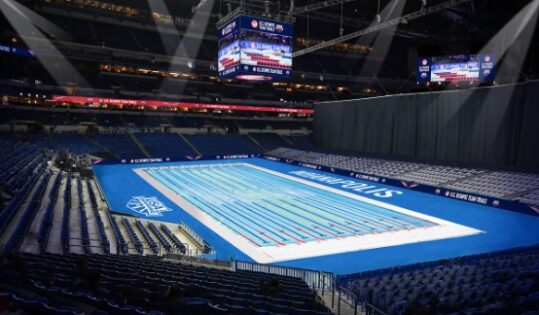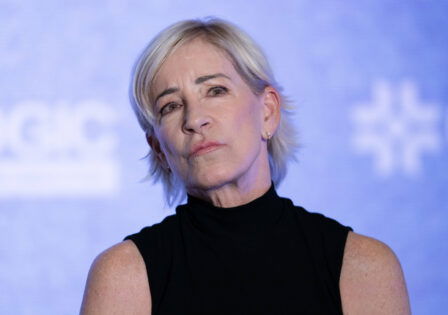May 21 was no ordinary day in the global swimming circuit — it was the day the rules of the sport were publicly challenged. The Enhanced Games, a controversial event that openly endorses performance-enhancing dr—, delivered on its promise of disruption. From its official X (formerly Twitter) account, the organization announced that four-time Olympian Kristian Gkolomeev had broken the 50m freestyle world record, twice over, smashing Caeleb Dressel’s 21.04 seconds in jammers and even eclipsing Cesar Cielo’s all-time best of 20.89. The twist?
He did it alone, in a pool, under the Enhanced Games banner — and walked away with a $1 million prize. But the record wasn’t the only bombshell dropped. The Games also released a documentary featuring James Magnussen, Gkolomeev, and Brett Hawke, exposing the use of performance-enhancing dr— and previously banned suits. The footage didn’t just show faster swimmers — it showed a movement: one that’s rewriting the boundaries of physical limits. However, the ripples reached far beyond the pool.
Just two weeks later, at its Bureau meeting on June 3, World Aquatics clapped back with a newly minted bylaw aimed squarely at the Enhanced Games. The regulation, which takes immediate effect, targets any athlete, coach, or organization that promotes or participates in doping-centric events. “This is about protecting the integrity of aquatics,” said President Husain Al Musallam. His words were crystal clear: enhanced sport has no place in the water. Though the Enhanced Games’ first event isn’t slated until 2026 in Las Vegas, World Aquatics isn’t waiting around. The message: join the Steroid Games, and you’re out of the official arena.
The fallout was swift. On June 4, news.com.au revealed that Swimming Australia had imposed an outright ban on any swimmer who takes part in the Enhanced Games. The move comes after former world champion James Magnussen became the face of the Games and fellow Aussie Brett Hawke was named head coach of its swimming team. Both men are now blacklisted from any future Olympic or world championship involvement. According to reports, Magnussen, retired for six years, had been using a cocktail of testosterone and peptides to chase down the 50m freestyle world record. That chase, however, was already lost to Gkolomeev. Still, he’s gearing up for another shot at the Las Vegas spectacle.
Credit: X/NCAA
Now, all eyes are on USA Swimming, where things aren’t so black and white. Coach Brett Hawke, who’s worked in the U.S. since 2006 and led Auburn University to an NCAA title in 2009, remains active in the American swimming scene. He still coaches athletes who may appear at the upcoming U.S. National Championships, despite now also coaching Enhanced Games swimmers. Hawke said his mindset shifted after listening to Enhanced Games founder Dr. Aron D’Souza on the Joe Rogan podcast.
“I’m pretty open-minded and progressive with my thoughts,” Hawke said. “I like to listen to people’s arguments, and I thought they were pretty compelling.” While no formal penalty has been issued by USA Swimming, they sent a warning letter on May 30 to all national team athletes, coaches, and staff. The message was blunt: USADA and WADA are watching. Affiliating with the Enhanced Games might not yet be a rules violation, but the consequences are looming.
Enhanced Games’ chief raises questions on the swimming body’s imposed ban
As the bans roll in and the backlash intensifies, Enhanced Games founder Aron D’Souza isn’t pulling any punches. In a bold statement to The Athletic, the Australia-born entrepreneur accused World Aquatics of acting out of fear, not principle.
“This ban isn’t about protecting athletes,” D’Souza declared. “It’s about protecting a monopoly.” He didn’t stop there. D’Souza turned the spotlight back on the sport’s governing bodies, calling out what he sees as decades of neglect.
“World Aquatics hasn’t paid its athletes for decades. Now, faced with real competition and real momentum, they’ve fallen back on threats and bullying tactics.” Framing the Enhanced Games as a liberation movement, D’Souza painted a picture of a new era in sport — one that’s unapologetically science-driven and financially empowering. “At the Enhanced Games, athletes have what traditional federations never gave them: choice, fairness, and real money. We offer a medically supervised, safety-focused, science-driven arena where performance is rewarded, not policed by outdated ideology.” But the global watchdogs aren’t buying it.
Credit: Instagram/Aron D’Souza
The World Anti-Doping Agency (WADA) has already slammed the Enhanced Games as a “dangerous and irresponsible concept,” warning that it threatens not only the health of athletes but the ethical foundations of sport itself. As the rhetoric heats up on both sides, one thing is certain — the Enhanced Games have launched more than just a new sporting model. They’ve ignited a philosophical war over the future of athletic performance.
The post Fresh Warning for US Swimming Community as Big-Time Rival Nation Bans Stars Under New World Aquatics Laws appeared first on EssentiallySports.



